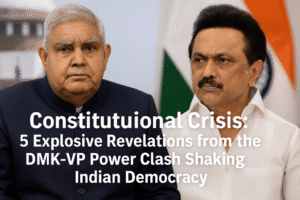Constitutional Crisis: 5 Explosive Revelations from the DMK-VP Power Clash Shaking Indian Democracy
A heated debate has ignited after Vice-President Jagdeep Dhankhar claimed the Supreme Court “cannot order the President,” drawing sharp criticism from Tamil Nadu’s ruling DMK. The party’s mouthpiece, Murasoli, accused Dhankhar of undermining judicial authority, questioning whether constitutional figureheads like the President and Governors are “above the Constitution.”
The clash stems from Tamil Nadu Governor R.N. Ravi withholding assent to 10 state bills for years, prompting the Supreme Court to direct the President and Governor to resolve the impasse—a first in India’s history. Dhankhar denounced the order as “undemocratic,” while legal experts cite Article 142, empowering courts to ensure “complete justice.” Critics argue such executive defiance erodes federal trust, with Governors increasingly stalling bills in opposition-ruled states, politicizing their role.
The DMK highlights a double standard: Would the Centre tolerate presidential defiance of its own Cabinet? This tussle underscores deeper concerns about judicial independence, federal accountability, and whether India’s democratic institutions can self-correct while upholding constitutional supremacy.

Constitutional Crisis: 5 Explosive Revelations from the DMK-VP Power Clash Shaking Indian Democracy
A sharp constitutional debate has erupted after Vice-President Jagdeep Dhankhar claimed the Supreme Court “cannot order the President,” sparking accusations of undermining judicial authority. The DMK’s editorial mouthpiece, Murasoli, launched a scathing critique, framing Dhankhar’s remarks as a threat to India’s democratic fabric. At stake is a foundational question: Are constitutional figureheads like the President and Governors immune to judicial oversight, or do they remain bound by the Constitution they swear to uphold?
The Trigger: Tamil Nadu’s Bill Impasse
The controversy stems from Tamil Nadu Governor R.N. Ravi’s refusal to act on 10 state bills—some pending since 2020—despite repeated appeals. After the state government moved the Supreme Court, the bench directed the President and Governor to resolve the impasse within three months. This marked the first time the apex court issued such an order, challenging the conventional understanding of the President’s “immunity.”
VP Dhankhar condemned the ruling as “an attack on Indian democracy,” arguing that courts lack authority to “direct the President.” His remarks drew fierce backlash, with DMK leader M.K. Stalin accusing appointed officials (like Dhankhar) of overstepping elected mandates.
Constitutional Ambiguity: What Does the Law Say?
Murasoli’s editorial hinges on two constitutional questions:
- Article 142: Grants the Supreme Court power to pass orders “necessary for doing complete justice.” Critics argue this empowers the court to intervene in governance gaps, including presidential inaction.
- Article 361: Shields the President from legal proceedings during their term but doesn’t explicitly bar judicial review of their constitutional duties.
Legal experts note that while the President acts on ministerial advice (Article 74), withholding assent indefinitely creates a constitutional vacuum. The Supreme Court’s intervention, they argue, reaffirms its role as the Constitution’s guardian.
Historic Precedent: In 1974, the SC ruled that the President’s decision to withhold assent to a bill isn’t absolute and must follow constitutional morality (Puranchand Lakhand vs Union of India).
Federalism at Stake: Governors as Political Actors
The Tamil Nadu case isn’t isolated. Governors in Kerala, Telangana, and Punjab have similarly stalled bills, often aligned with the ruling party at the Centre. This raises concerns about Governors morphing into “agents” of the Union, sabotaging state legislatures’ sovereignty.
Murasoli posed a hypothetical: If the President ignored the Union Cabinet’s advice, would Dhankhar defend such defiance? The analogy underscores fears of double standards in upholding constitutional duties.
Why This Clash Matters
- Judicial Independence: Dhankhar’s critique mirrors recent attacks on the judiciary by ruling-party leaders, including labeling the Collegium system “opaque.” Critics see this as an attempt to weaken judicial checks on executive overreach.
- Erosion of Federal Trust: States argue that gubernatorial obstruction stifles regional mandates. Tamil Nadu’s bills—covering critical areas like education and public health—remain in limbo, directly impacting governance.
- Democracy vs. Technocracy: The DMK’s rebuttal emphasizes elected governments’ primacy over appointed posts. With state elections looming, this tussle could deepen Center-state rifts.
The Road Ahead
The Supreme Court’s directive has set a landmark precedent, asserting that constitutional functionaries aren’t above accountability. However, the Union government’s response—whether it complies or contests—will shape India’s democratic trajectory.
As legal scholar Gautam Bhatia notes, “Constitutional offices derive authority from the people, not vice versa.” The DMK-Dhankhar clash isn’t merely political—it’s a litmus test for whether India’s institutions can self-correct while preserving the Constitution’s sanctity.
You must be logged in to post a comment.